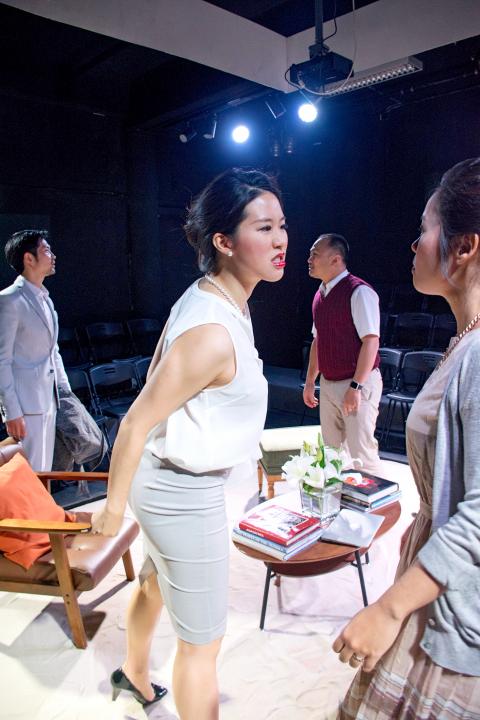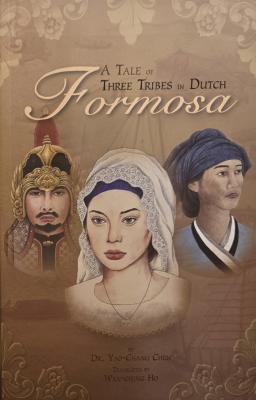If there’s one show that you don’t want to miss this summer, it’s LAB Space’s presentation of Yasmina Reza’s God of Carnage, playing over the next two weekends.
In Carnage, which won the Tony Award for best play in 2009, director Jaime Zuniga has put together a strong, talented cast to meet the demands of a play where there are no small parts and no heroes. Two sets of parents, who meet to resolve a fight between their sons, quickly expose their own dysfunctional marriages in a loser-take-all match where all are basically on stage for a full 90 minutes.
Yong Hui-shurn (楊慧珊) plays Veronica, a writer determined to preserve civilization, its values and symbolic books. She drives the play by arranging the meeting. Derek Kwan (關顯揚) plays Michael, her husband, and a “Neanderthal-type” blue collar.

Photo courtesy of Cheng Yi Lee
On the opposing team is Alan, a busy lawyer played by Lawrence Ong (翁書強). He wants the mundane incident to be settled in 15 minutes so he can get back to his more important clients and work. Lesley Hu (胡世恩) plays Annette, his demure wife. Despite her initial reserved poise, she wreaks carnage by the play’s end.
The lines come fast and furious, and the play dissects not just marriage, but children, families and the point of existence. Each actor and actress has their moment of revelation and vulnerability as all four alternately contest in couple vs couple and gender vs gender battles where the veneer of civilization crumbles and even the symbolic books take a beating.
Making use of LAB Space’s flexible space, Zuniga skillfully stages this one-set play as a close, intimate theatre in the round where any seat is good as the four combatants move about as boxers in a ring. With four-letter words flying in criticism and retaliation, this is not a show for children.
We are “lumps of clay,” Michael jokes at the beginning, but what these four adult enfants terribles fashion by the play’s end is not the most promising. You will laugh, but also be forced to reflect.
■ The LAB Space (實演場), 3F, 9, Beitou Rd Sec 1, Taipei City (台北市北投路一段9號3樓). Remaining shows are tomorrow and Sunday and July 1-3. All shows begin at 8pm, doors open 7:30pm. Tickets are available from NT$600 at: www.accupass.com/go/carnage; for more information, check: thelabtw.com.

May 11 to May 18 The original Taichung Railway Station was long thought to have been completely razed. Opening on May 15, 1905, the one-story wooden structure soon outgrew its purpose and was replaced in 1917 by a grandiose, Western-style station. During construction on the third-generation station in 2017, workers discovered the service pit for the original station’s locomotive depot. A year later, a small wooden building on site was determined by historians to be the first stationmaster’s office, built around 1908. With these findings, the Taichung Railway Station Cultural Park now boasts that it has

The latest Formosa poll released at the end of last month shows confidence in President William Lai (賴清德) plunged 8.1 percent, while satisfaction with the Lai administration fared worse with a drop of 8.5 percent. Those lacking confidence in Lai jumped by 6 percent and dissatisfaction in his administration spiked up 6.7 percent. Confidence in Lai is still strong at 48.6 percent, compared to 43 percent lacking confidence — but this is his worst result overall since he took office. For the first time, dissatisfaction with his administration surpassed satisfaction, 47.3 to 47.1 percent. Though statistically a tie, for most

Six weeks before I embarked on a research mission in Kyoto, I was sitting alone at a bar counter in Melbourne. Next to me, a woman was bragging loudly to a friend: She, too, was heading to Kyoto, I quickly discerned. Except her trip was in four months. And she’d just pulled an all-nighter booking restaurant reservations. As I snooped on the conversation, I broke out in a sweat, panicking because I’d yet to secure a single table. Then I remembered: Eating well in Japan is absolutely not something to lose sleep over. It’s true that the best-known institutions book up faster

The excellent historical novel by Chen Yao-Cheng (陳耀昌) is a gripping tale of Taiwan in the 17th century, called Formosa at the time, told from the perspective of characters representing the three major ethnic groups (the “tribes” mentioned in the title): the indigenous community, the Dutch and the Chinese. Another element that makes this book stand out is the female perspective, as two of the main protagonists are Maria, the daughter of the Dutch missionary Hambroeck, and Uma, an Aboriginal woman with a strong character. The main Chinese character is Chen Ze, a man in charge of a merchant ship